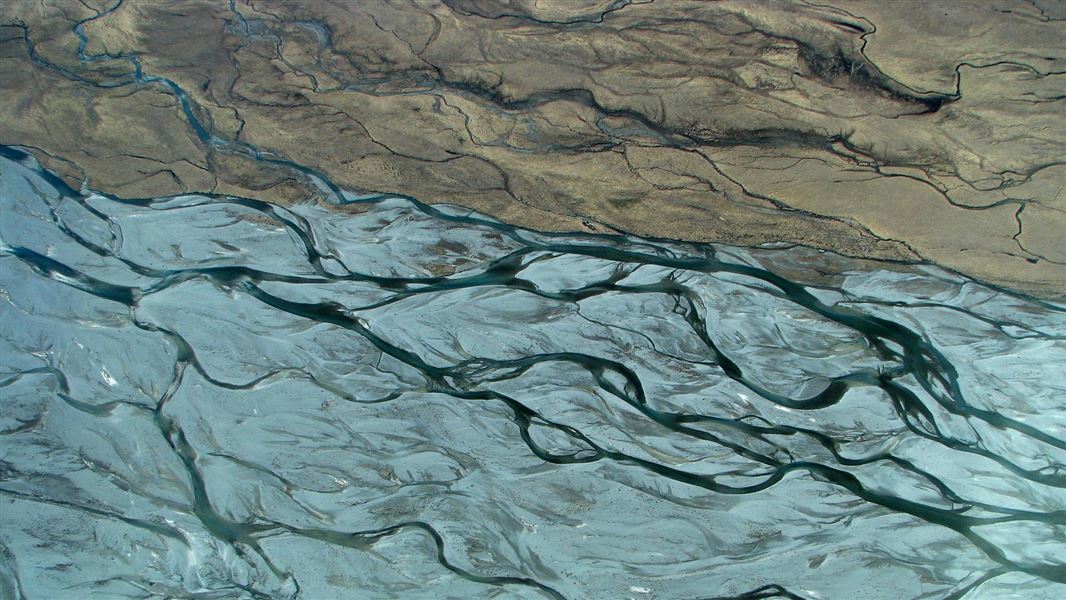PRR was established in 1990, recognising the impacts of hydroelectric development on braided rivers and wetlands. The project is funded through a compensatory agreement with Meridian Energy Limited and Genesis Energy.
PRR's work includes intensive weed control, predator control, construction and maintenance of wetlands, and research and monitoring programmes. This work is complemented by a public awareness campaign aimed at increasing knowledge and respect for braided rivers and their unique wildlife.
Weed management
PRR collaborates with land managers in the Upper Waitaki Basin to protect braided rivers and wetlands from weeds. The project gives highest priority to reducing current populations and preventing new incursions of invasive weeds at sites :
- that are still relatively weed-free, such as the Tasman River/Te Awa Whakamau, Godley River/ Whimiahoa and the Dobson River/Ōtaao; or
- where there is direct benefit to a threatened species, such as at bird nesting sites or in lizard habitat.
Testing predator control to benefit braided river species
PRR is working to test and improve predator control methods to benefit threatened braided river species. Predator control techniques are being tested at various scales and intensities including over entire catchments and around single populations of a species.
Tasman River/Te Awa Whakamau
In collaboration with the Kakī Recovery Project and Te Manahuna Aoraki Project.
Experimental predator control in Tasman River/Te Awa Whakamau began in 2004 with the aim to reduce predation of braided river birds to a level where depleted populations are recovering, and large populations are stable.
The project takes a catchment-scale approach, using a wide variety of control methods to protect approximately 16,000 Ha of braided river and adjacent buffer areas. Predator control is implemented throughout the year, with different methods applied at strategic times to maximise removal of target species.
Success of the project is assessed on achieving target increases in fledgling success and population growth for a range of river birds. A walk-through river bird survey is also conducted every spring to record long-term changes to species assemblage and abundance.
Upper Ōhau River
Since 1998, PRR has been monitoring and managing one of the world’s largest colonies of the Nationally Endangered black-fronted tern/tarapirohe that nests annually on an island in the Upper Ōhau River (often referred to as ‘Tern Island’).
Different intensities of predator control have been tested at 6-year intervals to identify what level is required to benefit nesting success for this species.
Developing best practice for hedgehog control in braided river ecosystems
PRR is contributing to the development of a ‘Current Agreed Best Practice’ document for the control of hedgehogs in braided rivers and in other habitats in Aotearoa. This includes research into the effectiveness of rabbit-proof fences as barriers to hedgehog movement and the development of a hedgehog-specific toxin for broadscale use.
Best practice guidelines for internal DOC use are due to be available by the end of 2024 and updated with results of toxin field trials by mid-2025. These guidelines will facilitate development of recommendations for hedgehog control for other organisations and community groups.
PRR will utilize these guidelines when undertaking predator control along braided river and wetland margins.
For more information on why hedgehogs are a threat to our endemic fauna see hedgehogs.
Research and monitoring
PRR conducts research and monitoring to build knowledge of the natural heritage values in braided river systems.
Current projects include:
- Understanding black-fronted tern/tarapirohe (Chlidonias albostriatus) natal site fidelity: Since 2018, chicks from the Tasman/Te Awa Whakama, Cass/Te Awa-a-Takatamira, and Upper Ōhau Rivers have been marked to see if they return to their birthplace to breed.
- Monitoring threatened grasshopper population trends and distribution: Since 2017, the Nationally Endangered robust grasshopper (Sigaus robustus) has been tracked in six rivers systems to understand population trends and changes in distribution.
- Understanding how changing water levels impact threatened ephemeral plants in wetlands: PRR created ponds in the 1990s, now home to rare plants. Water levels are adjusted to study how they affect plant distribution and abundance.
- Surveying Australasian bittern/matuku hūrepo distribution in the Upper Waitaki Basin: Since 2019, acoustic devices have been used in up to 20 wetlands each spring to detect the presence of booming males and understand their distribution.
- Conducting annual braided river bird surveys: Surveys are conducted in the Upper Waitaki Basin to track bird population changes, with each river surveyed for three consecutive years.
Publications
Rivers Rare: The first 25 years of Project River Recovery 1991-2016
Neville Peat’s book Rivers Rare outlines the work that PRR has achieved in its first 25 years, taking the reader through the project’s initial seven years of work. It also looks closely at the unique species that can be found in the Upper Waitaki Basin’s braided rivers and adjacent habits. This book is available on request.
Strategic plan
- Project River Recovery Interim Strategic Plan 2020-2023 (PDF, 586K)
- Project River Recovery Strategic Plan 2012-2019 (PDF, 2,192K)
Contact the Twizel office for copies of earlier plans.
Annual report
- Project River Recovery Annual Report 2024-25 (PDF, 3,306K)
- Project River Recovery Annual Report 2023-24 (PDF, 6,999K)
- Project River Recovery Annual Report 2022-23 (PDF, 5,772K)
- Project River Recovery Annual Report 2021-22 (PDF, 6,145K)
- Project River Recovery Annual Report 2020-21 (PDF, 4,500K)
- Project River Recovery Annual Report 2013-14 (PDF, 885K)
- Project River Recovery Annual Report 2012-13 (PDF, 410K)
- Project River Recovery Annual Report 2011-12 (PDF, 282 K)
- Project River Recovery Annual Report 2010-11 (PDF, 272 K)
- Project River Recovery Annual Report 2009-10 (PDF, 95K)
- Project River Recovery Annual Report 2008-09 (PDF, 88K)
Contact the Twizel office for copies of earlier annual reports.
Resources
- Braided River Care Code brochure (PDF, 418K)
- Braided River Field Guide (PDF, 1,720K)
- Braided rivers poster (PDF 1,650K)
Contact
DOC Customer Service Centre
| Phone: | 0800 275 362 |
| Email: | info@doc.govt.nz |
| Address: | Te Manahuna / Twizel Office |
